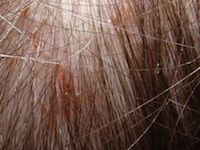Article
Sensitive Skin No Match for New Shampoo for Hair Transplant Patients
Author(s):
Researchers have developed a new rinse-off, hypertolerant shampoo specifically designed for the hypersensitive and problematic scalp.

Many people probably don’t give much thought to their choice of shampoo. (Is it on sale? Is it pre-mixed with conditioner? Can I just use soap instead?) But for people with dry scalp, patients who have undergone a hair transplant, or people with hyperreactive skin conditions, using abrasive shampoo—or one filled with perfumes, colorants, or parrafins—can lead to greater irritation, skin peeling, burning, pain, and pruritis.
A recent paper in Clinical, Cosmetic, and Investigational Dermatology introduces a new shampoo for sensitive and problematic scalp. The shampoo, developed by cell biologists at Beiersdorf AG, a German personal care company with brands including Eucerin and Nivea, is a new rinse-off, hypertolerant shampoo specifically designed for the hypersensitive and problematic scalp.
The test shampoo utilized in the course of the study (Eucerin® DermoCapillaire Hypertolerant Shampoo, Beiersdorf AG, Hamburg, Germany) contained decylglucoside, sodium myreth sulfate, PEG-8, PEG-200 hydrogenated glyceryl palmate, disodium PEG-5 lauryl citrate sulfosuccinate, PEG-90 glyceryl isostearate, and bisabolol. Notably, it did not contain perfumes, colorants, or other potentially abrasive materials. “To successfully treat a sensitive scalp, an effective shampoo needs to comprise an extra mild surfactant system to protect the natural skin barrier and lipid system,” the researchers note. “It should also contain an agent which exerts soothing and anti-inflammatory actions.”
To test the shampoo, the researchers chose a particularly tough user pool: patients who had recently undergone hair transplantation. Skin can remain hyperreactive after wounding or postoperatively.Forty-five subjects (42 male and three female; 20—65 years) qualified for study participation after a previous hair transplantation.
Study participants used the test shampoo starting 2 days after surgery until stitch removal (7-23 days). The results, measured by dermatological scalp examinations performed by plastic surgeons as well as in volunteers’ self-assessments, showed a significant reduction in the extent of scabbing and erythema. Data showed an excellent skin compatibility and product efficacy of the test shampoo, especially for the specific requirements after hair transplant. The plastic surgeons highly recommended the further use of the test shampoo after hair transplant to all study participants.
Because symptoms of scalp sensitivity are predominantly subjective, study participants filled out questionnaires about the use of the shampoo. “Data demonstrated that subjects perceived significant benefits from the test product,” the study authors conclude. “They stated examples with significant agreement that the shampoo gently removes scabs and alleviates itching. Both characteristics are extremely important after hair transplantation to ensure a smooth healing process and a satisfactory outcome of the transplantation.”





